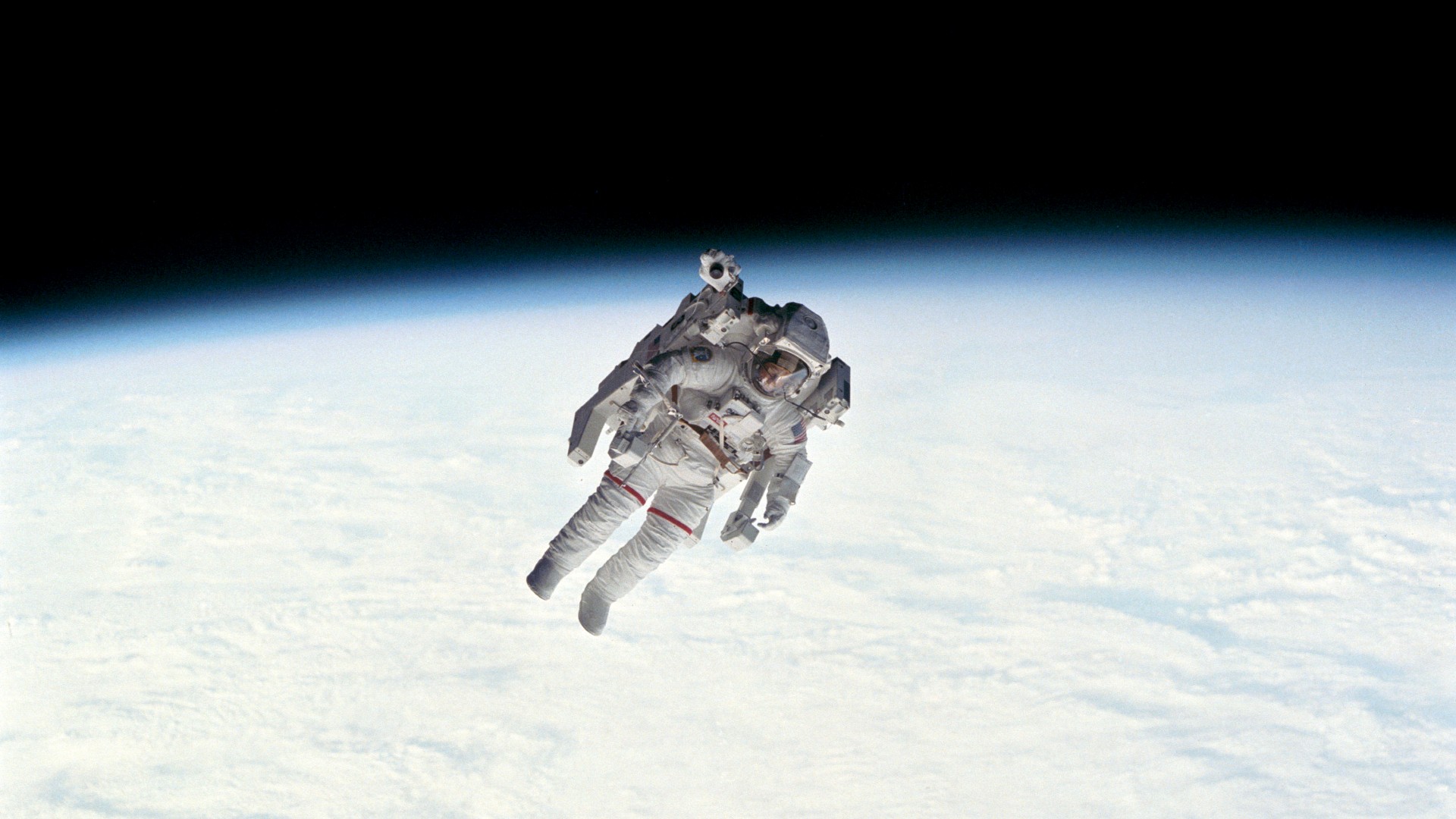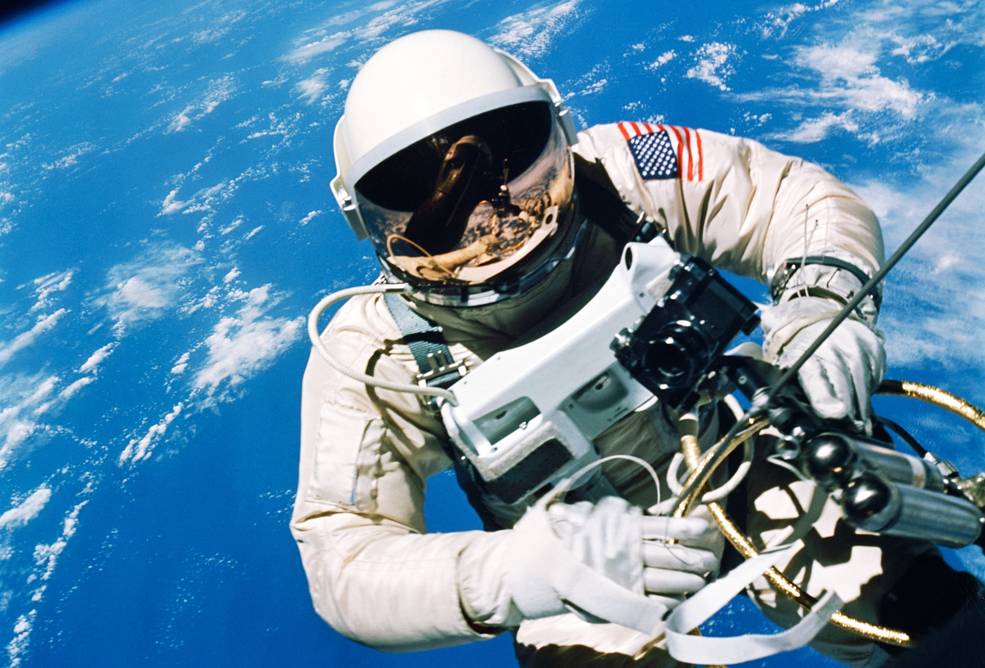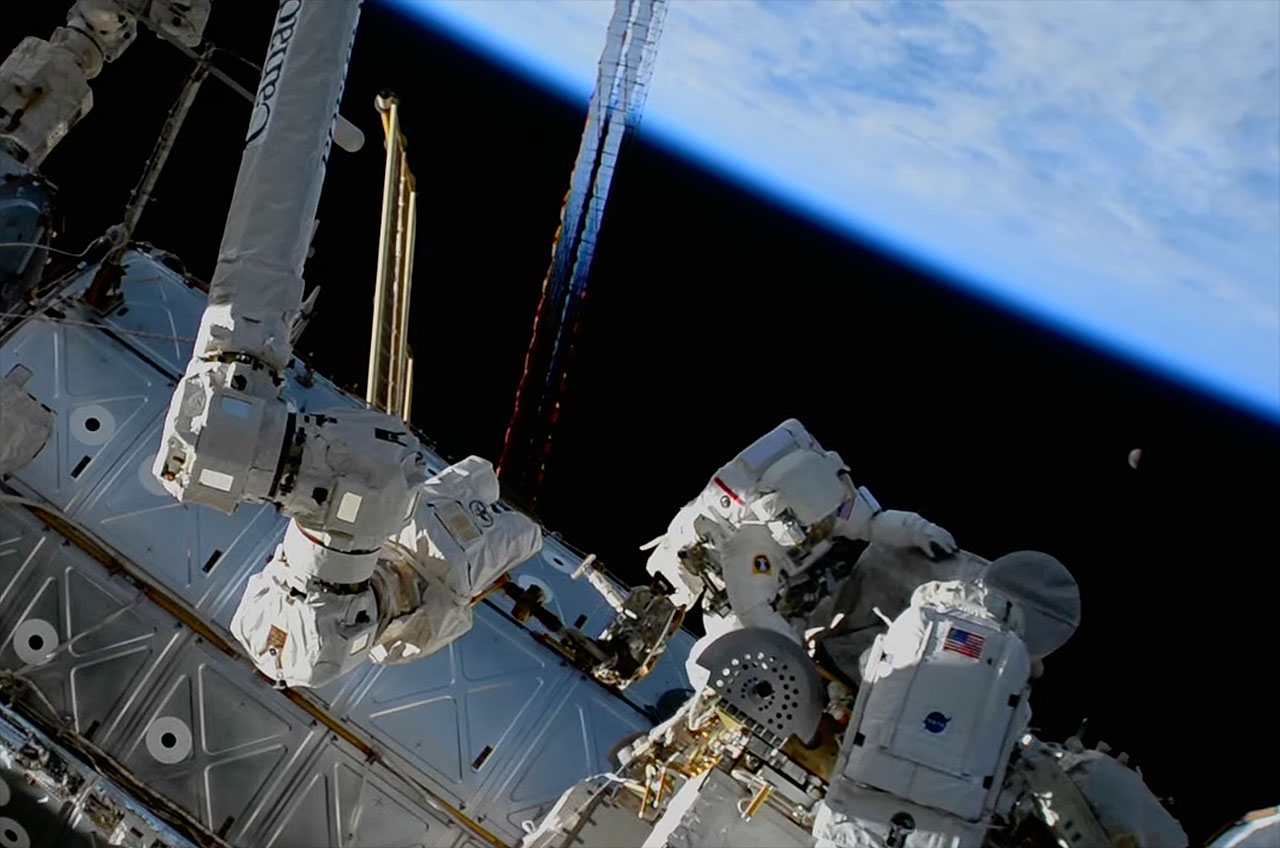How long could you survive in space without a spacesuit?
The vacuum of space is unforgiving, and time is not on your side.


Many of us have dreamed of going into space. Perhaps you've imagined what it would be like to visit the International Space Station or even explore new worlds. But traveling in space brings a whole set of challenges and hostile environments, so it's vital to recreate the conditions on Earth that have allowed life to evolve and flourish.
Spacesuits allow astronauts to venture outside their spacecraft for short periods, by providing the air, water, pressure and physical protection needed for a human to survive. But what would happen without one of these advanced suits?
Sci-fi movies and shows, including "2001: A Space Odyssey" and "The Expanse," have portrayed astronauts suffering — and surviving — short exposures to outer space without a spacesuit, while others have depicted a range of grisly deaths.
But here in the real world, how long could a person survive if thrust into the harsh vacuum of outer space? The short answer is, not very long.
Related: The 25 scariest spaceflight moments show dangers in orbit and beyond
"Within a very short time, a matter of 10 to 15 seconds, you will become unconscious because of a lack of oxygen," according to Stefaan de Mey, a senior strategy officer at the European Space Agency (ESA) charged with coordinating the strategy area for human and robotic exploration.
That may seem like a very short time, but it's because you would not want to hold your breath before being thrust into outer space. In the dark void of space, the oxygen that sustains us would become a serious problem.
Get the Space.com Newsletter
Breaking space news, the latest updates on rocket launches, skywatching events and more!
"The oxygen starts expanding and rupturing your lungs, tearing them apart — and that would cause boiling and bubbling of your blood, which immediately will cause embolism and have a fatal impact on your body," de Mey said.
Divers face a similar danger when the water pressure decreases as they ascend from the depths. Before entering space unprotected, you'd need to empty your lungs as much as possible. The complete lack of pressure also causes other, though less immediately, deadly issues.

Bodily fluids, such as saliva and tears, would begin to boil. A human body would also expand, but the skin would be elastic enough to cope with the pressure change, de Mey said, adding that horrific movie portrayals of exploding humans are not accurate.
In the best-case scenario, you'd have a few seconds before the oxygen in your bloodstream would be used up, causing you to pass out. Because you'd be unable to alter your dire situation, brain death would follow within minutes, unless you were rescued and brought back to the safety of the pressurized, oxygen-rich environment of a spacecraft and resuscitated.
In addition to providing vital oxygen and pressurization, spacesuits also shield astronauts from other dangers and harm.

"There is a temperature problem and radiation and micrometeoroid threats," de Mey said. "So spacesuits are designed to provide physical protection of the astronauts in outer space."
Whether an astronaut is in sunlight or shaded from the sun, they would experience extreme temperatures, ranging from minus 240 to 250 degrees Fahrenheit (minus 150 to 120 degrees Celsius) in low Earth orbit (LEO). These conditions would cause burns or freezing, though not immediately in the latter case, as body heat is not easily conducted away in a vacuum.
Spacesuits also protect from various types of radiation. In LEO, there is protection from some forms of radiation. Prolonged or long-term exposure to electromagnetic radiation from the sun would cause health issues, including radiation sickness and an increased risk of cancer. UV light would also burn the skin. The added misfortune of particles from a solar flare reaching the astronaut at the time they were exposed in space would exacerbate many of these issues.
Micrometeoroids and space debris pose another danger. These travel at a rate of a few or tens of kilometers per second and are a threat to satellites, spacecraft and astronauts conducting extravehicular activities (EVAs), or spacewalks. Though extremely unlikely to affect an unprotected astronaut's chances of survival given the astronomically tiny chances of being hit during a short time in space, spacesuits are designed with multiple layers to help protect astronauts from any possible micrometeoroids or space debris whizzing around in orbit.
Being in space without an EVA suit becomes very deadly — very, very quickly. While someone could survive this grim scenario, they would want to have very little air in their lungs and get back to the safety of a pressurized spacecraft within seconds — or hope to be rescued and resuscitated within minutes.
Join our Space Forums to keep talking space on the latest missions, night sky and more! And if you have a news tip, correction or comment, let us know at: community@space.com.

Andrew is a freelance space journalist with a focus on reporting on China's rapidly growing space sector. He began writing for Space.com in 2019 and writes for SpaceNews, IEEE Spectrum, National Geographic, Sky & Telescope, New Scientist and others. Andrew first caught the space bug when, as a youngster, he saw Voyager images of other worlds in our solar system for the first time. Away from space, Andrew enjoys trail running in the forests of Finland. You can follow him on Twitter @AJ_FI.
-
unclefishbits ReplyAdmin said:How long could a person survive if thrust into the harsh vacuum of outer space? The short answer is, not very long.
How long could you survive in space without a spacesuit? : Read more
The lung full of air as error, aside, I think you just need to have the bright idea to find a passing spaceship and get rescued by it.
"The Hitch Hiker's Guide to the Galaxy says that if you hold a lungful of air you can survive in the total vacuum of space for about thirty seconds. However it goes on to say that what with space being the mind boggling size it is the chances of getting picked up by another ship within those thirty seconds are two to the power of two hundred and sixty-seven thousand seven hundred and nine to one against.
By a totally staggering coincidence that is also the telephone number of an Islington flat where Arthur once went to a very good party and met a very nice girl whom he totally failed to get off with — she went off with a gatecrasher.
Though the planet Earth, the Islington flat and the telephone have all now been demolished, it is comforting to reflect that they are all in some small way commemorated by the fact that twenty-nine seconds later Ford and Arthur were rescued". -
MrD Reply
When I saw Kubrick's 2001 in 1968 at a first run theater in Wash DC, they gave out a short pamphlet that explained the science between Dave's transfer from his EVA pod to the emergency airlock without a spacesuit helmet to let viewers know it was scientifically possible.Admin said:How long could a person survive if thrust into the harsh vacuum of outer space? The short answer is, not very long.
How long could you survive in space without a spacesuit? : Read more -
DrZacharySmith The title of the article is "how long could you survive in space without a spacesuit". Not long is not a valid answer. Specific answer. Oh, and yeah, if you didn't exhale before stepping into vacuum your lungs would explode. Corollary question, would your eyes explode if you were in a vacuum?Reply -
adnico 1/10: Surprisingly, given the journalist's and the quoted scientist's credentials, the article is mostly wrong, or at least misleading, even in the context of accidental exposure, and certainly in a novel context of hypothetical (and feasible) deliberate managed exposure by selected and trained individuals.Reply
The article sadly repeats and recycles vague but sensational received wisdoms published many times before online and in print, adding no new facts, figures, evidence or insights and missing a new frontier of human potential.
Rapid (Explosive) Decompression Emergencies in Pressure-Suited Subjects (1960s NASA report title) are not the only possible contexts to pose the question in the article's title. -
adnico 2/10: The pressure difference between standard surface pressure and the vacuum is of course 1 atmosphere, the same as the difference between a modest 10 metre water depth and the surface. It is only necessary to half-exhale before exposure to the vacuum, because the lung's contents, a mix of air (or oxygen), CO2 and water vapour will only double in size. No big deal to SCUBA and free-divers! No "expanding and rupturing your lungs, tearing them apart would cause boiling and bubbling of your blood, which immediately will cause embolism and have a fatal impact on your body". No "need to empty your lungs as much as possible", but you do need to close your glottis.Reply -
adnico 3/10: "Bodily fluids, such as saliva and tears" might "begin to boil". But not (with tears) if the subject closes their eyes or wears scleral or "sclera" contact lenses, lubricated with a non-boiling fluid. And not (with saliva) if the subject keeps their mouth closed! Holding or pegging the nose would be protect the nasal mucous membranes. The ear canals could also be plugged to protect the inner ear, with customised earbuds also handy for comms. Besides, at zero pressure and at body-surface temperature, boiling is not the same as scalding, and would likely be experienced as a cooling fizzing sensation. Not "deadly issues"! Nor would your eyes explode.Reply -
adnico 4/10: "Within a very short time, a matter of 10 to 15 seconds, you will become unconscious because of a lack of oxygen"? No. Trained breath-holders in the fields of free-diving and competitive apnea have achieved records of over 24 minutes after pre-breathing 100% oxygen, and over 11 minutes (man) or 9 minutes (woman) without, so a selected and trained volunteer can likely achieve at least half these times - more than enough to re-enter an airlock, or remain in a terrestrial lab vacuum chamber, and re-pressurise.Reply -
adnico 5/10: Some physiological side-effects of zero pressure could be mitigate with a porous elastane (Spandex/Lycra) or similar full-body 'Spiderman'-type elastic suit. Nothing drastic should happen to the skin specifically, in the absence of air pressure. As the article states, the skin is "elastic enough to cope with the pressure change".Reply
Valsalva-type manoeuvres could potentially maintain internal body pressure (which, like its temperature, is not uniform) at above the Armstrong limit. -
adnico 6/10: Temperature is not the same phenomenon in a vacuum as in air, with no conduction or convection - think of a Thermos or vacuum flask.Reply
While highly advisable to avoid sunshine, a few seconds' or minutes' exposure would not cause thermal burning - it's just very bright light - only UV sunburn, and a special strong sunblock cream could minimise that. Tinted or rapid photochromic contact lenses would be advisable.
As for the cold, a human body will slowly radiate heat, but it will probably be many minutes before becoming cold enough for shivering to start, and very many more before hypothermia sets in. A stretch suit with an insulation layer would greatly reduce thermal radiation losses, to the point of being barely a problem, given normal metabolic heat production or a few simple exercises.









